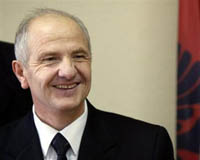Serbia, Kosovo hold mediated talks

Mediators will help Serbia ’s and Kosovo’s leaders to achieve constructive decision on province’s future status, as the new round of negotiations has begun.
But the chance of a breakthrough remained slim. Serbia vehemently opposes independence for Kosovo; Kosovo's ethnic Albanian leaders demand it.
"Our vision and our stance is very clear: it's the independence of Kosovo and its recognition," said Kosovo's President Fatmir Sejdiu as he arrived for the negotiations. "There are absolutely no alternatives."
Former rebel leader Hashim Thaci, who is likely to become the province's next prime minister, said Kosovo would not rush into declaring independence.
"Kosovo will do nothing without coordination with our partners Washington and Brussels," Thaci said.
Serbia's President Boris Tadic and Prime Minister Vojislav Kostunica refused comment when they arrived at EU headquarters for the talks.
All sides have suggested the negotiations, mediated by the EU, the United States and Russia, are unlikely to provide a compromise by Dec. 10, when the mediators are to report to U.N. Secretary General Ban Ki-moon.
But the EU's envoy to the talks, Wolfgang Ischinger, said he was optimistic progress could be made.
Ischinger sat down with the other two mediators, U.S. representative Frank Wisner and Russian diplomat Alexander Botsan-Kharchenko before holding separate talks with Kosovar and Serbian leaders.
All parties will join a single round of talks later Tuesday, diplomats said.
On the table is a plan by Ischinger, backed by Washington, to offer both sides a "status-neutral" pact in which Belgrade and Pristina agreed on practical measures such as trade ties and border issues without addressing independence.
However Russia remains cool on the plan, as does Serbia.
European nations are worried that the absence of an agreement backed by the U.N. Security Council could lead to new instability in the Balkans.
The province has been under U.N. control since 1999, when NATO intervened to stop a Serbian military crackdown on ethnic Albanian separatists. NATO is currently in charge of Kosovo's security and keeps a 16,000-strong peacekeeping force in the province.
Subscribe to Pravda.Ru Telegram channel, Facebook, RSS!


